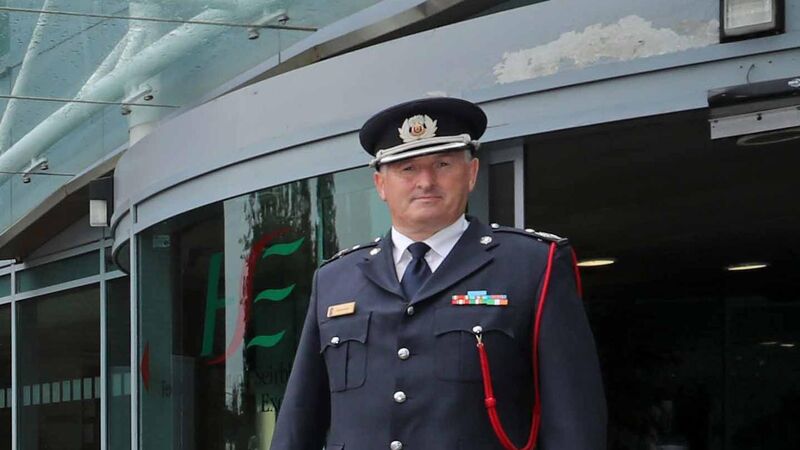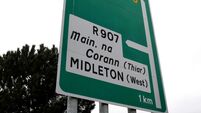Reach out to lonely, isolated neighbours, Cork City Fire Service urges

Victor Shine, second officer at Cork City Fire Brigade, said that frontline workers have to deal more often with the loneliness of members of the public.Picture: Jim Coughlan.
A high-ranking fire officer is pleading with people to check on their neighbours after a number of heartbreaking calls from the elderly.
Victor Shine, second officer at Cork City Fire Brigade, said that frontline workers have to deal more often with the loneliness of members of the public.
Loneliness, Mr Shine said, is among the more poignant issues that Cork’s emergency services deal with.
Firefighters have attended calls at homes where deceased occupants lay undiscovered for considerable periods.
It is sometimes weeks before any concerns are raised. This is largely due to isolation.
Mr Shine’s appeal to neighbourliness comes months after an inquest last October heard that the body of Cork man Tim O’Sullivan — found by Cork County Council staff in January 2023 — had remained undetected in a Mallow house for more than two decades. His family expressed fears at the time that the tragedy may not have been an isolated incident.
Mr Shine said that loneliness and isolation are still common.
“It is a problem,” he said.
“In the last few months, we have come across deceased people in their houses who would have been there for a considerable length of time. You would think that those days are gone, but these kinds of things are still happening. This is why it is so important that we remember to check on our neighbours. People can help through that bit of support.”
January can be a grim month for people suffering from anxiety or depression.
“You see people getting deeper into depression post-Christmas,” Mr Shine said. “We see this before Christmas as well, but it’s typically after. It’s a difficult time, when the good times are over and that’s when you need the support. Mental-health issues affect everybody, from the very old to the very young. However, for the older community it’s mainly loneliness.”
People with mental-health issues frequently call the service for help.
“The fire-safety side of things isn’t as much of an issue as it once was, because of improved engineering and better materials,” Mr Shine said. “That’s very positive. However, many of the calls we are attending have a mental-health focus.
"This is a particularly difficult time of year for many people. When the nights draw in, you see people getting more depressed. This can often relate to the financial strains of the festive season. Some are paying back for the good times after Christmas, which can take a toll on one’s mental health.”
"There is light at the end of the tunnel,” Mr Shine said.
“There are lots of lots of things that can kind of cause anxiety and stress. However, some people may not always realise that tomorrow will always be there to solve the problem. We have people on the verge telling us they are suffering because of the breakdown of a relationship.
“This might only be a small thing when you look at the bigger picture. Males typically can get very depressed after the breakdown of a relationship. At times, it seems like the end of the world. Others are at a different stage of their life, where they are dealing with the pressures of raising families. There could be 101 different things, but each problem is relative.”
Fianna Fáil councillor and GP Dr John Sheehan, who owns Blackpool Bridge Surgery, said he has referred people to social prescribers in the past as a means to tackle loneliness. The practice involves supporting people with positive social outlets in the community. This could include anything from a choir to a hillwalking club, depending on their interests.
Loneliness can be more difficult to admit to than a physical ailment, Dr Sheehan said. “It’s easier to go to your GP with a sore knee or leg than tell them we are lonely, because we all have our pride. Loneliness is an issue, especially at this time of year, and people can experience it very acutely.
“The role of the social prescriber is very useful in that sense. If people are agreeable, they will put the person in touch with groups in the community and guide them in a way that helps them become more active in the community. They are very skilled at linking them in with groups that are of interest to that individual. The list of things to do in the community has become far more diverse.”
Dr Sheehan is urging communities to promote inclusion.
“Of course, a lot of people will have family, friends, and neighbours, and people looking out for them,” Dr Sheehan said. “Some are very engaged in their communities by participating in senior citizens groups or even just going to the shop. However, there are others who, due to illness or mood, are more shy and maybe a little bit more isolated.
"People are often more vulnerable during the winter months, when there are not as many people out and about. These are the individuals that we need to make a special effort for. It’s important to ensure that they are OK, because loneliness can have a significant impact in terms of mental-health outcomes.
“There are a lot of people out there who are lonely. This doesn’t just happen in rural areas and can also be an issue in a busy city.”
Dr Sheehan spoke about how people can often withdraw from society gradually. Sometimes people can stop engaging and going to events. Social prescribers can guide people to use social activities to alleviate loneliness.
Loneliness can potentially lead to mental-health issues or contribute to physical ailments.
“Unfortunately, we saw with covid the impact loneliness can have, where mental-health issues are concerned,” Dr Sheehan said. “This is also the case with physical conditions, like cardiovascular disease. We are naturally social individuals, who like to engage with people. That’s why it’s so important that we look out for our neighbours and make a special effort.
“There are people out there who don’t have family in Cork. Others might have family members who are abroad, making them that little bit more vulnerable. You could be in the middle of a busy town and still feel very lonely.”
A number of charities in Cork are working to reduce isolation in communities.
For example, ALONE works with older people, including those who are lonely or isolated. They also provide support to older people affected by illness, homelessness, or poverty.
- To find out more visit https://alone.ie/







 App?
App?


